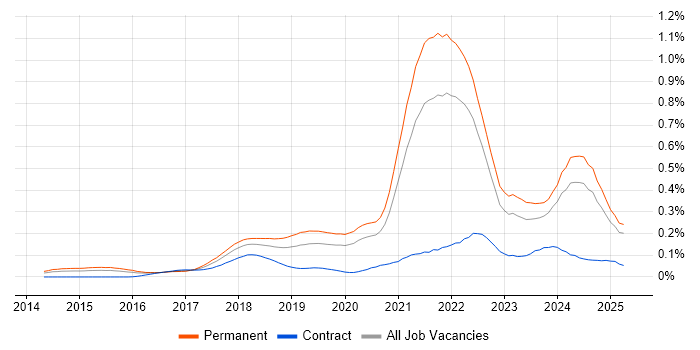Full-Stack Engineer
England > South East
The median Full-Stack Engineer salary in the South East is £65,000 per year, according to job vacancies posted during the 6 months leading to 4 May 2025.
The table below provides salary benchmarking and summary statistics, comparing them to the same period in the previous two years.
| 6 months to 4 May 2025 |
Same period 2024 | Same period 2023 | |
|---|---|---|---|
| Rank | 264 | 315 | 338 |
| Rank change year-on-year | +51 | +23 | -46 |
| Permanent jobs requiring a Full-Stack Engineer | 19 | 78 | 64 |
| As % of all permanent jobs advertised in the South East | 0.22% | 0.47% | 0.43% |
| As % of the Job Titles category | 0.26% | 0.50% | 0.47% |
| Number of salaries quoted | 18 | 34 | 24 |
| 10th Percentile | £43,750 | £39,459 | £52,392 |
| 25th Percentile | £62,500 | £52,188 | £61,250 |
| Median annual salary (50th Percentile) | £65,000 | £60,000 | £70,000 |
| Median % change year-on-year | +8.33% | -14.29% | +3.70% |
| 75th Percentile | £67,500 | £70,000 | £80,313 |
| 90th Percentile | £72,500 | £81,454 | £117,500 |
| England median annual salary | £70,000 | £70,000 | £80,000 |
| % change year-on-year | - | -12.50% | +1.59% |
All Permanent IT Job Vacancies
South East
For comparison with the information above, the following table provides summary statistics for all permanent IT job vacancies in the South East. Most job vacancies include a discernible job title that can be normalized. As such, the figures in the second row provide an indication of the number of permanent jobs in our overall sample.
| Permanent vacancies in the South East with a recognized job title | 7,441 | 15,681 | 13,534 |
| % of permanent jobs with a recognized job title | 86.10% | 93.90% | 90.54% |
| Number of salaries quoted | 4,481 | 11,335 | 8,483 |
| 10th Percentile | £30,000 | £27,500 | £29,750 |
| 25th Percentile | £41,250 | £36,000 | £40,000 |
| Median annual salary (50th Percentile) | £55,000 | £50,000 | £55,000 |
| Median % change year-on-year | +10.00% | -9.09% | - |
| 75th Percentile | £68,750 | £65,000 | £71,250 |
| 90th Percentile | £79,250 | £77,500 | £85,000 |
| England median annual salary | £57,500 | £53,500 | £60,800 |
| % change year-on-year | +7.48% | -12.01% | +1.33% |
Full-Stack Engineer
Job Vacancy Trend in the South East
Job postings that featured Full-Stack Engineer in the job title as a proportion of all IT jobs advertised in the South East.

Full-Stack Engineer
Salary Trend in the South East
3-month moving average salary quoted in jobs citing Full-Stack Engineer in the South East.
Full-Stack Engineer
Salary Histogram in the South East
Salary distribution for jobs citing Full-Stack Engineer in the South East over the 6 months to 4 May 2025.
Full-Stack Engineer
Job Locations in the South East
The table below looks at the demand and provides a guide to the median salaries quoted in IT jobs citing Full-Stack Engineer within the South East region over the 6 months to 4 May 2025. The 'Rank Change' column provides an indication of the change in demand within each location based on the same 6 month period last year.
| Location | Rank Change on Same Period Last Year |
Matching Permanent IT Job Ads |
Median Salary Past 6 Months |
Median Salary % Change on Same Period Last Year |
Live Jobs |
|---|---|---|---|---|---|
| Surrey | +68 | 10 | £65,000 | +4.00% | 5 |
| Thames Valley | +50 | 5 | £65,000 | +8.33% | 6 |
| Buckinghamshire | +32 | 5 | £65,000 | -4.73% | 2 |
| Hampshire | +26 | 1 | £70,000 | +7.69% | 10 |
| Kent | - | 1 | £40,000 | - | |
| Full-Stack Engineer England |
|||||
Full-Stack Engineer Skill Set
Top 30 Co-occurring Skills and Capabilities in the South East
For the 6 months to 4 May 2025, Full-Stack Engineer job roles required the following skills and capabilities in order of popularity. The figures indicate the absolute number co-occurrences and as a proportion of all permanent job ads across the South East region featuring Full-Stack Engineer in the job title.
|
|
Full-Stack Engineer Skill Set
Co-occurring Skills and Capabilities in the South East by Category
The follow tables expand on the table above by listing co-occurrences grouped by category. The same employment type, locality and period is covered with up to 20 co-occurrences shown in each of the following categories:
